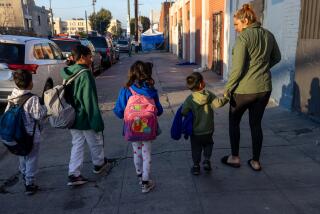LAMP Shelter for Mentally Ill on Skid Row Finally Gets a Green Light
- Share via
If it’s true that politics is the art of compromise, then it was politics that gave a major boost Thursday to some of the mentally ill people who live on and around Skid Row in downtown Los Angeles.
After more than a year of haggling, Mayor Tom Bradley and a dais full of officials announced that they had assuaged the fears of Skid Row merchants about plans for a residential shelter for the mentally ill. As a result, the shelter, to be called the LAMP Village, could be open in about a year to help 45 men and women who now live on the streets or in slum hotels.
From the start, this project was different. Instead of fighting each other, officials in city and county government agreed that the shelter was a good idea. But the business owners who coexist with the poor and abused on Skid Row felt otherwise, complaining that the new shelter could tip the balance in favor of the street people.
There were lawsuits and snarly zoning battles in City Hall, but on Thursday everyone came away happy.
The merchants, through the Central City East Assn., agreed to drop their lawsuit against the shelter, which is to be located in an unused city-owned warehouse on Crocker Street. They even praised the work of LAMP (formerly the Los Angeles Mens Place), the private service agency that already runs a drop-in center for mentally ill men on Skid Row.
In return, the merchants won a point they have long wanted. Bradley, who announced the agreement, said the city will begin a planning study that will lead to the area surrounding Skid Row being designated as a distinct neighborhood downtown.
By creating what urban planners call a “specific plan” for the area that surrounds Skid Row, the toy manufacturers and food suppliers who own property and work there will be guaranteed a stronger voice in the future of their section of downtown. The specific plan will spell out the course of development and zoning changes for the area, and the property owners will wield considerable influence over the process.
In the past, the Skid Row property owners have felt that their concerns carried less weight in City Hall than those of leaders in Little Tokyo, Bunker Hill and other downtown areas.
“Such a specific plan is desperately needed,” said Charles Woo of ABC Toys, spokesman for the business owners’ group.
The Central City East area, as it is called, is the battleground in a fight over how best to handle the homeless and other poorest of the poor in Los Angeles, including a few thousand believed to suffer from untreated psychiatric maladies. The largest shelters and rescue missions are located in the Skid Row area, and some officials want the social services designed to help the homeless to be contained there.
But the merchants, some of whom complain about the lines of sleeping bodies on the sidewalks in front of their businesses, do not want their side of downtown to bear the full cost of the city’s homeless problem.
From the government side, the new shelter will add a much-needed quality to the services provided to the homeless. The LAMP center now operating serves about 80 mentally ill men a day, and its work is widely respected among county health officials and other service agencies.
The new shelter will provide what social workers call “transitional housing,” a place where 45 mentally ill people who spend most days now just trying to survive the dangers of Skid Row can take a few months to collect their lives.
It could make its greatest impact on Skid Row life in another way, however. Half of the warehouse will be converted into businesses, such as a coin laundry and alcohol-free grocery store, that will make a profit providing services that are scarce on Skid Row. Residents and clients of the other LAMP center will be employed there.
Part of the building will also be turned into public showers and toilets, which virtually do not exist on Skid Row.
“We’ve been held up by hearings and zoning appeals and settlement meetings since last April, almost a year now,” said Mollie Lowery, director of LAMP.
More to Read
Sign up for Essential California
The most important California stories and recommendations in your inbox every morning.
You may occasionally receive promotional content from the Los Angeles Times.










